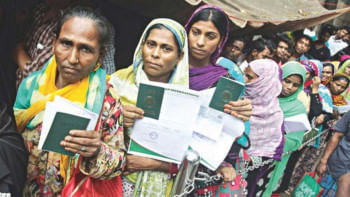Give returning migrants the help they need

When it comes to economic statistics—such as GDP growth or foreign reserves—we often shower our migrant workers with praise. Yet our gratitude seems to fall short when it comes to providing returnees with the material and psychological support they need.
A report published recently highlights the physical and mental trauma many migrants face abroad. It cites the case of 24-year-old Layek Mia, who left for Oman in good health but returned home after five years so incapacitated that he now cannot move without assistance. Over the last five years, Brac has helped about 105 such returnees, but experts estimate the actual number is four to five times higher. Alarmingly, women make up nearly 80 percent of the migrant workers returning home with physical, mental, financial, or sexual trauma.
In fact, the Business & Human Rights Resource Centre, a UK-based non-profit, reports that just in the first half of this year, there were 30 allegations of abuse against Bangladeshi migrant workers by renowned companies, mostly headquartered in the US, UK, and Saudi Arabia. Often, foreign employers send migrants back home empty-handed, as mere shadows of their former selves.
Unfortunately, the support returnee migrants receive from the state is negligible or often nonexistent. Families of migrant workers who die abroad receive a one-time disbursement from the Wage Earners' Welfare Board fund. However, families of returnee migrants—especially those suffering from mental abuse or physical ailments that leave them unable to work—are left without any support. Many are not even aware of how to access the fund or apply for assistance. In fact, the whole journey of a migrant worker remains fraught with challenges from start to finish.
While addressing hurdles in the recruitment process is critical, it is equally important to ensure that our workers are treated with fairness and respect in their host countries. The government must prioritise the rights of our migrants and work to hold abusive employers accountable through foreign authorities. Establishing shelter homes or safe spaces at foreign missions, with support from affluent Bangladeshi communities abroad, could be a meaningful step.
However, the rehabilitation of returnees coming home with physical and mental trauma is even more crucial. The Wage Earners' Welfare Board fund could be used to improve services at the airport to better assist these migrants and guide them to the help they need. It could also support trauma survivors and their families in meaningful ways.
The interim government has received unequivocal support from migrant workers, and taken several positive steps so far. However, much more remains to be done. We urge it to establish a permanent mechanism to aid returnees in the long term.

 For all latest news, follow The Daily Star's Google News channel.
For all latest news, follow The Daily Star's Google News channel. 










Comments